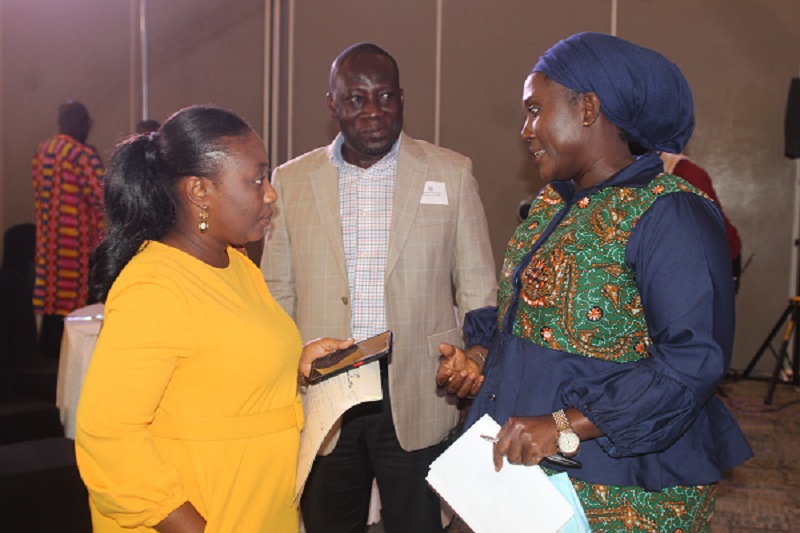
SMEs need equity financing not loans - GM, Venture Capital
The General Manager of Venture Capital Trust Fund (VCTF), Hamdiya Ismaila, has said that Ghanaian small and medium enterprises (SMEs) require more equity financing to grow and not loans.
She said it was only equity financing that could give businesses more long-term leverage to build and grow their businesses, explaining further that with equity financing, small businesses did not need to service the investment unlike loans.
Speaking in an interview shortly after the third quarter Graphic Business/Stanbic Bank Breakfast Meeting in Accra on August 10, she said businesses did not need loans to start because the country’s interest rate regime did not support that kind of business growth as expected.
“Everything is about loan in Ghana but you don’t need a loan go start a business unless you're really going to import and sell and get the cash flows immediately.
“You go and borrow from the bank and you are paying 25 per cent. How much is your margin? So, you are actually working for the bank because at that time, you don’t need a loan,” she said.
The Fund
Ms Ismaila said the VCTF, although provided the alternative early-stage financing, it faced a challenge in the market because everything was centred around debt.
She recognised that although banks had a role to play, there was the need for the Fund to play a bigger role in building the businesses for the banks to leverage.
“We promote lots of equity investments which is more long-term investment to build businesses: to start and grow the businesses: and then the banks come in.
“In supporting a business, it’s from start up to maturity. For any business, it is just equity and anything in between. So, you can do bridge finance, you can go mezzanine finance. The instruments we are even using in this country is just very basic. It’s not debt so you plough everything back in, then you grow the business,” she said.
She said the financial service delivery in the country must be more diversified.
“Every business has its own specific need and usually it is not debt. And so, the moment everything in Ghana is about loan- you have to go for a loan the business won’t grow,” she said.
Growing businesses
According to her, a lot of entrepreneurship programmes had been held but that did no really bring a lot of the money home and which required a broader look in the financial services industry.
“We must ensure that anytime that anybody needs money to expand, grow or start a business, there is a certain kind of financing for them. We blame banks all the time that they are not lending to the SMEs but certain SMEs are not ready for bank money.
We need to get other forms of money. There are alternatives and so we need to look at that,” she said.
One the policy side, she noted that a lot of money could be mobilised domestically, thus the country moved from a pension system that was very government dominated to a private pension system that is deregulated.
“Just from 2010 to now, we have assets of over 30 billion that are being managed by private pensions. And all this money still goes into government bonds.”
“We should allocate certain amount of money into the real sector where the jobs are created, invest along the value chain. That is where we feed ourselves, and so if we are not paying attention to the real sector and everything, we are doing is very superficial then,” she said.
Right policies
On his part, the president of the Association of Ghana Industries (AGI), Dr Humphrey Ayim-Darke, said another way for the country to increase its revenue base was through industrialisation.
He said the structure of the economy was still very focused on the export of raw materials, which was not the best for the country.
He noted that Ghana still exported all its resources, such as gold, timber, cocoa and oil, in their raw state, which did not fetch enough for the country.
“Over 60 per cent of the items exported are still in the raw state, and as long as you do that, your revenue streams will not be sustainable enough to meet the various needs and wants of your country.
“So the limited resources as a result of the pre-colonial structure become a hindrance to living within our means,” he stated.Over 100 participants from the business community, academia, civil society and think tanks attended the event.
Side bar
The Graphic Business-Stanbic Bank Breakfast Meeting is a quarterly event organised by the Graphic Communications Group Ltd (GCGL) for the business community to exchange ideas on the prospects of the economy.
Last Wednesday’s meeting which was the third for this year was on the theme: “Living within our means: An imperative for economic success.”
Over 100 participants from the business community, academia, civil society and think tanks attended the event.
Keynote
Venture Capital Trust Fund VCTF forms joint-ventures with other institutional partners such as banks, insurance companies, and development finance institutions to establish Venture Capital Finance Companies (VCFC)
The Fund invests in fund managers in the business of supporting Small and Medium Enterprises in priority sectors of the economy, specified from time to time.